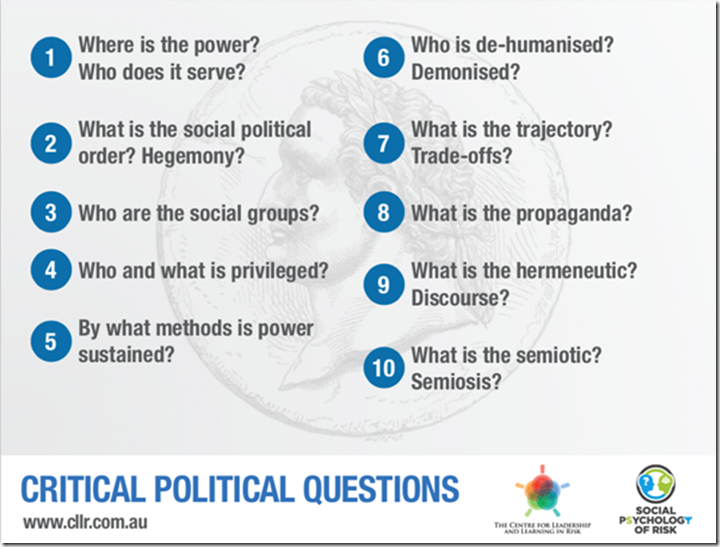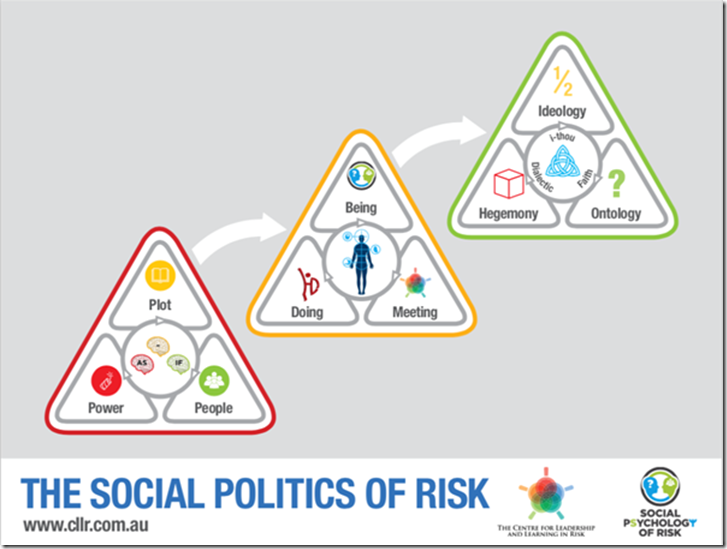Often when Safety make noise about something it’s often about its opposite, such is the code of safety (https://safetyrisk.net/deciphering-safety-code/ ) or like saying something is ‘different’ when it isn’t.
When we hear Safety speak about critical thinking, it is not reference to critical thinking. Cognitive activity, reflective thought and speech about thinking is not critical thinking. Critical thinking emerges out of the Frankfurt School and Critical Theory and is about the deconstruction of political, ethical and power in Discourse. In the risk and safety industry, there is no such discussion of power, politics and ethics. The Chapter on Ethics is about a deontological ethic of duty, compliance and rationalist behaviourism. There is no deconstruction of power or ethics in the BoK. Safety rarely talks about power or politics.
Without a clear articulated ethic and politick of risk, there is no critical thinking.
You can learn more about critical theory here: https://mahollandela.weebly.com/uploads/5/4/9/5/54951553/critical-theory-today__1_.pdf
Critical thinking is about deconstructing something, articulating its dynamics in relation to power, politics and ethics and reconstructing that something so it serves a humanizing ethic, community and the value of personhood.
There are of course a range of schools that define critical thinking differently (https://louisville.edu/ideastoaction/-/files/featured/reimers/critical-thinking-theories.pdf ) each presenting a worldview (methodology) but this is also another silence of safety. And there are many more silences (https://safetyrisk.net/category/safety-culture-silences/ ).
Safety never talks about worldviews or the subjectivities that determine interpretation from worldviews. In that way, Safety can imagine that every incident investigation and method, every audit and regulation is an objective presentation of reality, when it is not.
When we investigate Critical Thinking in the Social Psychology of Risk (SPoR) we start with worldviews (methodologies) and critical questions (se Figure 1. Critical Political Questions). We also start with an investigation of schools of ethics (which Safety is silent about) and seek congruence between Care Ethics, Helping, Professionalism and how the industry tackles risk. Needless to say, the unethical and unprofessional ideology of zero is exposed for its brutalism the moment one applies a deconstructive lens to it.
Figure 1. Critical Political Questions
When we apply a deconstructive lens to the social politics of risk (see Figure 2. The Social Politics of Risk) we see how the foundations of Plot, People and Power emerge in trajectories of Ideology, Hegemony (organized power) and Ontology (theory of being).
Figure 2. The Social Politics of Risk
It is in this movement that we realise the power of critical thinking. We begin to see the unconscious forces and dynamics at work in things otherwise unseen.
Of course, deconstruction is nothing to fear. There is nothing wrong with the negativity that emerges from deconstruction because it is a critical skill required for reconstruction. It is simply nonsense to be like some who reject negativity as some kind of evil, who speak about the absence of negatives and only paying attention to positives in risk (https://safetydifferently.com/what-safety-ii-isnt/ ). It surely is about a balance in positives and negatives and one really won’t get to the real negatives without critical thinking.
Here is a little video chat I had with Matt Thorne that might help.
Critical Thinking from CLLR on Vimeo.





Do you have any thoughts? Please share them below